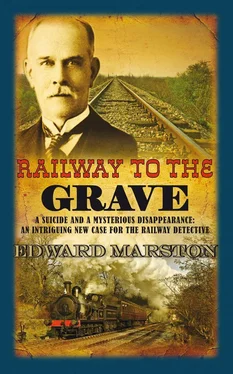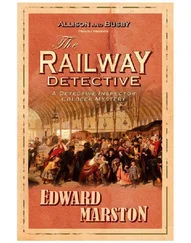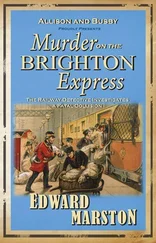Edward Marston - Railway to the Grave
Здесь есть возможность читать онлайн «Edward Marston - Railway to the Grave» весь текст электронной книги совершенно бесплатно (целиком полную версию без сокращений). В некоторых случаях можно слушать аудио, скачать через торрент в формате fb2 и присутствует краткое содержание. Жанр: Исторический детектив, на английском языке. Описание произведения, (предисловие) а так же отзывы посетителей доступны на портале библиотеки ЛибКат.
- Название:Railway to the Grave
- Автор:
- Жанр:
- Год:неизвестен
- ISBN:нет данных
- Рейтинг книги:5 / 5. Голосов: 1
-
Избранное:Добавить в избранное
- Отзывы:
-
Ваша оценка:
- 100
- 1
- 2
- 3
- 4
- 5
Railway to the Grave: краткое содержание, описание и аннотация
Предлагаем к чтению аннотацию, описание, краткое содержание или предисловие (зависит от того, что написал сам автор книги «Railway to the Grave»). Если вы не нашли необходимую информацию о книге — напишите в комментариях, мы постараемся отыскать её.
Railway to the Grave — читать онлайн бесплатно полную книгу (весь текст) целиком
Ниже представлен текст книги, разбитый по страницам. Система сохранения места последней прочитанной страницы, позволяет с удобством читать онлайн бесплатно книгу «Railway to the Grave», без необходимости каждый раз заново искать на чём Вы остановились. Поставьте закладку, и сможете в любой момент перейти на страницу, на которой закончили чтение.
Интервал:
Закладка:
The two men were travelling by rail to Northallerton. It gave Colbeck the chance to describe the frosty confrontation with Frederick Skelton, the obdurate rector, and it allowed Leeming time to moan about his unhappiness.
‘I miss my wife dreadfully,’ he confessed. ‘It’s not the same when Estelle is not there. When can I go back to her?’
‘Not until this mystery is solved.’
‘Well, I think that it already has been. I didn’t take to that self-important railway policeman but I fancy that he may be right. The colonel’s wife ran away from him.’
‘Then whom did she run to, Victor?’ asked Colbeck. ‘That’s what puzzles me. The obvious person to go to would be her daughter yet that’s not what happened. Mrs Tarleton would hardly just take to her heels without any idea of a destination.’
‘She could be in hiding somewhere.’
‘I doubt that. The suicide has had widespread publicity. It will even be in the London newspapers. Were she still alive, the colonel’s wife would surely have seen the news by now. With her husband dead, there’d be no need for her to conceal herself. No,’ he went on, ‘I incline to the view that she was murdered and that her body is still in the vicinity. We have to stay here until we can find it.’
Leeming groaned. ‘That could take ages, sir.’
‘Estelle will have to do without you for a little longer.’
‘Wait until you’re married. Then you’ll understand how painful it is to be without the woman you love.’
‘Oh, I’ve already found that out,’ said Colbeck, resignedly.
Northallerton was a long-established community with a population of around five thousand. It was a thriving market town, a parliamentary borough and the administrative centre of the North Riding. Though he’d already been there, Leeming had only touched the outskirts and he was interested to see the busy streets, fine houses, churches, public buildings, suites of offices and the countless shops at the heart of the place. The bank was situated in a prominent position in the High Street and, once they’d introduced themselves, they were conducted to the manager’s office.
Bertram Reader gave them an effusive welcome.
‘I’m so relieved to see you, gentlemen,’ he said, shaking their hands in turn. ‘This whole business needs to be sorted out once and for all. Do sit down.’
‘Thank you, sir,’ said Colbeck.
While he and Leeming settled into an armchair apiece, the manager returned to the high-backed chair behind his desk.
‘The North Riding has everything that one could desire,’ he went on, ‘but in one instance, it is glaringly deficient. It has, as yet, no county constabulary.’
‘Then it’s one of the last places in England to be without one,’ said Colbeck. ‘In the wake of a Royal Commission over fifteen years ago, an Act was passed enjoining all boroughs to examine the possibility of reorganising their police forces. Most have complied.’
‘I have high hopes that we will follow their example in the near future,’ said Reader. ‘What’s held us back, I need hardly tell you, is the fear of great expense.’
‘It’s more expensive to let crime go unchecked,’ said Leeming.
‘I couldn’t agree more, Sergeant. However, let’s forget our shortcomings with regard to law enforcement. We’re honoured to have two detectives from Scotland Yard to help us at this time of trial.’ He spread his arms. ‘Please feel free to ask me anything you wish.’
Reader was a trim figure in immaculate clothing. Still in his forties, he’d retained all of his hair and most of his youthful energy. The office was large and well appointed and the general impression was of an efficient man holding an important position at a high salary. They noticed how tidily he kept his desk, papers and files stacked neatly in order. Across that desk, thousands of transactions had been made over the years. Reader exuded a quiet benevolence. He was a man whom clients of the bank could trust.
‘I believe that you and the colonel were friends,’ Colbeck began.
‘That’s correct, Inspector,’ replied the other.
‘So you saw him and his wife a great deal.’
‘At least once a week, I’d say – until recently, that is. Over the last few months, it was more like once a fortnight.’
‘Why was that?’
‘The colonel told us that he was very busy. He turned down some of our invitations and accepted others. The four of us liked to play whist together.’
‘Did you play for money, sir?’ asked Leeming.
Reader smiled. ‘I’m a banker, Sergeant. I never gamble.’
‘That’s very wise of you. When I was still in uniform, I lost half a week’s pay in a card game. I learnt a lesson from that.’
‘On the day of her disappearance,’ said Colbeck, ‘Mrs Tarleton set out to walk to your home.’
‘She and Agnes – that’s my wife – intended to go shopping.’
‘What did Mrs Reader think when her visitor didn’t turn up?’
‘Well,’ said the banker, ‘she thought it very strange. It was unlike Miriam Tarleton to be late. Were she indisposed, she’d have sent someone with a message to that effect. By the time I got home that evening, my wife was very anxious. To put her mind at rest, I offered to ride over to the house but Agnes felt that unnecessary. She decided that a mistake had been made about the arrangements.’
‘Was Mrs Tarleton in the habit of making mistakes?’
‘Far from it – ordinarily, she was very reliable.’
‘How did she get on with her husband?’ asked Leeming.
‘What an odd question!’ said Reader. ‘If you’d known them, you’d never have needed to ask it. They were happily married and always had been.’
‘We were told there were tensions in the house.’
Reader was terse. ‘Then you’ve been misinformed, Sergeant. There were some tensions when the children were there, I grant you, but everything was much more serene after that. Adam was the problem. He was a natural rebel. His sister was a sweet girl and I was sorry when she left to get married. In all honesty, however, I have to admit that I was glad to see the back of Adam Tarleton.’
‘Adam and Eve,’ noted Colbeck. ‘Was Mrs Tarleton religious?’
‘She came from a clerical family,’ explained Reader. ‘Her father was a rural dean and her brother was in holy orders. Her first husband – God rest his soul – was a parish priest. He died of cholera and left her with two small children. When the colonel came into her life, it was a real blessing.’
Having hit his stride, Reader went on to describe the marriage in more detail and to pour scorn on the idea that Colonel Tarleton had murdered his wife. Appalled at the news of the suicide, he viewed it as an act of temporary madness and refused to condemn his friend.
‘It’s reassuring to hear someone speaking up for him,’ said Colbeck. ‘Early this morning, the superintendent and I were cornered by the rector of St Andrew’s, who told us bluntly that he wouldn’t allow the deceased to be buried in the churchyard.’
‘I think I know what’s behind that decision,’ said Reader.
‘So do I – ignorance of the law.’
‘There’s a more personal reason. Frederick Skelton studied theology with Miriam Tarleton’s first husband. They were very close. In fact, he was godfather to their children. The colonel attended church every Sunday but, clearly, he was nowhere near as devout a Christian as his predecessor.’
‘Did Mr Skelton resent that?’
‘Very much,’ said Reader. ‘And he resented the way that Adam – his godson, remember – was brought up by the colonel. There was no spiritual dimension to the boy’s life. No wonder he veered off the straight and narrow. Regarding the rector’s attitude to the funeral,’ he continued, ‘that’s not just an aversion to an act of suicide. Like so many other misguided people, he believes that the colonel killed his wife and is therefore a species of devil.’
Читать дальшеИнтервал:
Закладка:
Похожие книги на «Railway to the Grave»
Представляем Вашему вниманию похожие книги на «Railway to the Grave» списком для выбора. Мы отобрали схожую по названию и смыслу литературу в надежде предоставить читателям больше вариантов отыскать новые, интересные, ещё непрочитанные произведения.
Обсуждение, отзывы о книге «Railway to the Grave» и просто собственные мнения читателей. Оставьте ваши комментарии, напишите, что Вы думаете о произведении, его смысле или главных героях. Укажите что конкретно понравилось, а что нет, и почему Вы так считаете.












